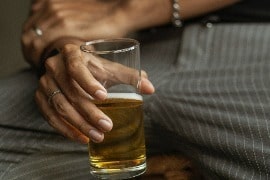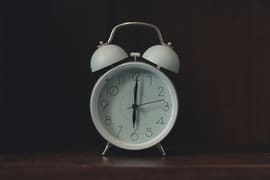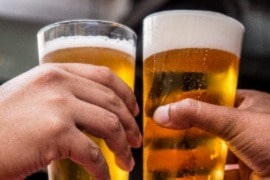Some studies show that alcohol consumption can create allergic reactions like hives.
If you have ever had an adverse reaction after drinking alcohol, you may be wondering, “Can alcohol cause hives?” According to the Australasian Society of Clinical Immunology and Allergy (ASCIA), alcohol consumption can sometimes cause and worsen hives.
How to Know If Alcohol Is Causing Your Hives
An alcohol allergy test may be necessary to determine if alcohol is causing your hives. The ASCIA reports that alcohol allergy tests tend to produce negative results, but some people may test positive for allergies to acetaldehyde or acetic acid, which are produced with the breakdown of ethanol.
Alcohol might be causing your hives if:
- You experience flushing of the skin or rash after drinking
- You’re allergic to a specific ingredient in alcohol
- You have a genetic metabolic dysfunction
Skin Flushing Can Indicate Alcohol-Induced Hives
The Cleveland Clinic advises that flushing of the skin (usually the face) after drinking alcohol is a sign that you have an allergy. If you experience flushing of the face after consuming an alcoholic beverage, there is a chance that alcohol is causing your hives. You can consult with a doctor, who can review your symptoms and perform an ethanol patch test to detect an allergic reaction to alcohol.
Alcohol Ingredients That Can Cause Allergies
Alcoholic beverages can contain a variety of ingredients that can cause an alcohol allergy, including:
- Grapes
- Yeast
- Hops
- Barley
- Wheat
- Salicylates
- Metabisulfites
Metabolic Dysfunction Can Cause Alcohol Allergy
According to the Cleveland Clinic, genetic metabolic dysfunction can also cause an allergic reaction to alcohol. When the enzyme alcohol dehydrogenase does not properly breakdown acetaldehyde, it builds up in your body and can cause reactions like hives.
In addition, acetaldehyde can cause the release of a chemical called histamine and produce inflammation.
Can Alcohol Make Hives and Skin Conditions Worse?
If you are sensitive to alcohol, drinking can cause an allergic reaction and make your hives worse. One studywith a patient with a history of hives found that levels of tryptase, a marker of an immune system response, increased with alcohol consumption. The patient developed hives on the chest and upper arms just minutes after drinking alcohol, suggesting that the alcohol caused the hives.
Alcohol consumption could worsen other skin conditions. For example, a review of the research shows that alcohol consumption is linked to psoriasis.
Related Topic: Alcohol Intolerance
Treatment for Hives Caused by Alcohol
You will likely have to restrict or eliminate alcohol from your diet if it causes an allergic reaction and results in the appearance of hives. Some people who experience hives caused by alcohol may have difficulty giving up drinking, despite the unpleasant side effects.
If you are finding it difficult to give up alcohol even though it causes hives, it is possible you are experiencing alcohol addiction or alcohol use disorder. Treatment for alcohol addiction may be necessary to make it possible for you to stop drinking and find relief from hives.
If you or a loved one struggles with alcohol addiction, The Recovery Village has locations across the country and can provide comprehensive alcohol rehab treatment services to help you recover. Reach out to a representative today to begin your journey toward healing. Your call is free and confidential, and there is no obligation to commit to treatment at The Recovery Village.
Articles Related to Alcoholism

Alcohol detox isn’t easy and not everyone can do it on their own. That is why alcohol detox and alcohol withdrawal treatment is administered by medical professionals.

Alcoholism takes many forms, and the stereotype doesn’t always hold true. So when do a few drinks with friends become a full-blown alcohol addiction? How do you know if you are an alcoholic?

While cirrhosis scars from excessive drinking are irreversible, quitting alcohol and leading a healthier lifestyle can help your liver heal from alcohol-related liver disease.

When detoxing, hydration is key. However, certain food groups also have benefits when it comes to helping with the discomfort of withdrawal symptoms and detoxification.

Detox from alcohol can begin within hours. Typically, alcohol withdrawal symptoms happen for heavier drinkers. Alcohol withdrawal can begin within hours of ending a drinking session.

Daily drinking can have serious consequences for a person’s health, both in the short- and long-term. Many of the effects of drinking every day can be reversed through early intervention.


Australasian Society of Clinical Immunology and Allergy. “Alcohol allergy.” March 2019. Accessed April 28, 2019.
Cleveland Clinic. “Alcohol intolerance.” November 7, 2017. Accessed April 28, 2019.
Emonet, S., et al. “Ethanol-induced urticaria: Elevated t[…]rolled challenge.” Dermatology, 1998. Accessed April 28, 2019.
Brenaut, E., et al. “Alcohol consumption and psoriasis: A […]iterature review.” Journal of the European Academy of Dermatology and Venereology, August 2013. Accessed April 28, 2019.
The Recovery Village aims to improve the quality of life for people struggling with substance use or mental health disorder with fact-based content about the nature of behavioral health conditions, treatment options and their related outcomes. We publish material that is researched, cited, edited and reviewed by licensed medical professionals. The information we provide is not intended to be a substitute for professional medical advice, diagnosis or treatment. It should not be used in place of the advice of your physician or other qualified healthcare providers.